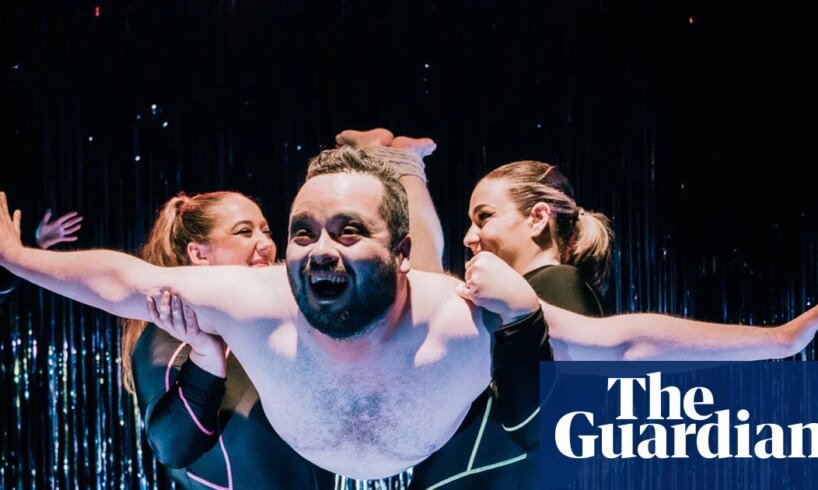
A nurse puts a steadying hand on my back and guides me to bed. She takes off my shoes, dresses me in soft pyjamas and hands me a VR headset. Mum will be along soon to read a bedtime story, she says. ZU-UK’s tender encounter Within Touching Distance is part of Take Me Somewhere, Glasgow’s biennial festival of wild-hearted international performance. With a teddy bear pressed into my hands, this is a deceptively gentle start to my day, which ends with a queering of the Apostles and a greased-up naked man being hand-fed fish.
A slow act of care-taking … Within Touching Distance. Photograph: Zu-UK
Within Touching Distance is a slow act of care-taking, walking one audience member at a time through the course of a life, from being read a story as a child to clutching a walking frame in old age. Blending the physical with the digital, this smartly choreographed piece fights against technology’s lack of intimacy; when I’m watching “Mum” squeeze my shoulder in my VR goggles, I feel my shoulder squeezed for real. When she wiggles my toes, I feel each one pinched in perfect time with the image. I’d have thought being caressed by a stranger would be disorienting, but I’m so snug in bed that the contact only feels comforting and safe.
The show works best in these framing scenes that ground us with physical contact, the story pressed into our skin. But with the bulk of the narration told solely through the VR, the middle is harder to hold on to, inviting vague philosophical questions and sorely missing the soft anchor of touch.
Two dance shows walk the line between the limitations and possibilities of the body. Dressed in intricately embroidered bridalwear, Mexican dancer Lukas Avendaño leaps off the indigenous Mexican concept of the gender-straddling “muxhe” to conjure the restrictions we have invented around identity. In Requiem para un Alcaraván, he picks through slow, feminine rituals and scattily sprinkled snippets of story, employing us to help create a celebration of queer bodies. We are his bar staff, stage managers, dance partners and translators. An uncaptioned improv scene is hard to hear above the recorded brass band, but this messy procession from marriage to mourning is an entertaining riot of colour, leaving the audience in a blazing tangle of bright streamers.
Celebrating queer bodies … Lukas Avendaño in Requiem para un Alcaraván.
Across town, Susanne Kirnbauer-Bundy defies expectations of the ageing female body. A former principal dancer with the Vienna State Opera, the elegant 83-year -old reclaims the spotlight in Come Back Again, which at times feels such an internal grappling that our presence as an audience is merely incidental. With flashes of raw beauty, this uneven production shines when Kirnbauer-Bundy is joined by her younger choreographer, Doris Uhlich, the limitations of the older woman’s movements a direct contrast to the younger’s speed and strength. Dancing together, they twirl the decades between them, a mirror and an archive, each oozing the joy of movement. Sitting together for a Q&A within the show, they shame the blinkered vision of the dance industry that continues to control a woman’s body, rejecting the idea that she can be too large or too old to be worthy of watching.
Reclaiming the spotlight … Susanne Kirnbauer-Bundy in Come Back Again. Photograph: Alexi Pelekanos
My day’s standout is Selkie: The Wet and Wild Show!, a slippery piece of high camp that comes with the warning of a splash zone. Naked and rope-tied at the ankles “for health and safety reasons”, Scottish performer Craig Manson is a mythical seal in human form. Slopping greasily into a paddling pool and skidding around the stage belly-first, with a permanent docile smile, he is fed instructions and fish by his wetsuited, increasingly cruel trainers (a lavishly hammy Agnes Evans-Forrest and Jessica Kucelin).
In a matching wetsuit, Melissa Toner’s imaginatively integrated BSL interpretation adds depth and complexity to this satirical comic-tragedy, keeping watch as our selkie interacts with the audience, flirting and probing and asking with wide, uncomprehending eyes, if we really get to go home whenever we want. A deliciously irreverent show, Selkie manages to sneak an unexpected meditation on animal rights and the misery of capitalism into its silliness. All while pumping out iconic queer anthems.
Closing the night, The Last Supper is an audacious piece of large-scale political theatre. Mexa are a decade-old activist-artist collective from Brazil, made up of primarily trans and queer performers. With experience of homelessness and gender-based violence, they met in São Paulo shelters. They deliberately reject the type of stories you might expect from these details; an earnest sob story wouldn’t last a second on this unruly, catty stage. Instead, under João Turchi’s volatile direction, the group announces their final show together: a goodbye deserving of a last supper.
Performed in Portuguese, grand attempts to recreate Leonardo da Vinci’s ubiquitous painting are curtailed by constant bickering, from creative debates to outright fist fights. If this performance is how they will be remembered, they say, it must be spectacular. So much is thrown at this haphazard cabaret that intentions are sometimes untethered, but the idea of determining your own legacy carries weight, especially as some of Mexa’s former members have gone missing in unexplained circumstances.
The cast’s stubborn, fleeting ideas overlay and interrupt, thrown together with documentary-style footage of their fractious rehearsal process. But for all the animosity, The Last Supper is an invitation. Transforming the stage into a banquet for 30 audience members, a lavish meal of meat, fruit and wine appears for those fast enough to claim a seat. Fuelled by solidarity and built from precarity, this charged, raucous performance clings to the messy resilience of found family, which can be relied on in the absence of all else.
Delicious … The Last Supper by Brazilian collective Mexa. Photograph: Maringas Maciel
Unexpected revelations and full-bodied participation are a constant at this festival. Across the UK, funding cuts continue to shut down performance venues and festivals, with European comparisons putting our funding models to shame. Last week MAYK, the company behind Bristol’s luminous international theatre festival, Mayfest, were the latest to announce their closure. What a relief that Take Me Somewhere has secured multi-year funding from Creative Scotland, covering the bold experiments of this festival and the next. Intrepid platforms committed to beauty, mess, wildness and risk should always have a seat at the table.





